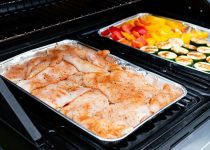How Does Temperature Affect Grill Cleaning?
Temperature significantly impacts your grill cleaning. High heat around 500°F effectively loosens stubborn residue, making scrubbing easier. On the other hand, using low heat is gentler, helping to loosen food particles without damaging components. Proper heating also prevents rust by evaporating moisture, safeguarding your grill's longevity. Consistent temperature management ensures better performance and durability. To master your grill cleaning routine with optimal temperatures, you'll want to explore more effective practices.
Table of Contents
Key Takeaways
- High heat (around 500°F) effectively loosens stubborn burnt-on food and grease, making cleaning easier.
- Low heat allows for gentle cleaning, preventing damage to grill components and minimizing the risk of flare-ups.
- Proper heating evaporates moisture, which helps prevent rust formation on grill surfaces.
- Consistent high temperatures create a protective layer, enhancing the grill's durability and performance.
- Preheating for about 15 minutes followed by scrubbing simplifies residue removal and prolongs the life of grill grates.
The Science Behind Grill Cleaning Temperatures
When you fire up your grill, understanding the science behind cleaning temperatures can make a big difference in maintaining its longevity.
The temperature at which you clean your grill directly affects how effectively you can remove grease and food particles. Lower temperatures mightn't break down residue as efficiently, leading to buildup over time.
Conversely, excessive heat can damage components or warp grills. Ideally, aim for a moderate heat that allows the residue to loosen without compromising the grill's integrity.
This balanced approach helps in achieving a thorough clean while protecting the materials. By mastering these cleaning temperatures, you'll ensure your grill remains in top shape for every barbecue, enhancing both performance and durability.
High Heat: Effective for Stubborn Residue
While a moderate heat can be effective for regular cleaning, high heat is your best friend when dealing with stubborn residue on your grill.
When you crank up the temperature, it helps to loosen burnt-on food and grease, making it easier to scrub away. Preheat your grill to a high setting, letting it reach around 500°F or more.
This intense heat creates a powerful cleaning environment that vaporizes leftover particles. After about 15 minutes, turn off the grill and let it cool slightly before using a grill brush to scrape off the remnants.
You'll find that the combination of heat and a good scrubbing tool can transform even the grimiest grill into a clean cooking surface, ready for your next barbecue.
Low Heat: A Gentle Approach for Maintenance
If you're looking to maintain your grill without the intensity of high heat, low heat offers a gentle approach that can effectively keep your cooking surface in good shape.
By preheating your grill on a low setting, you can loosen any leftover food particles without charring or damaging the surface. Once warmed, use a grill brush to scrub away debris easily.
This method not only makes cleaning less of a chore but also prolongs the life of your grill components. Additionally, low heat helps you avoid the risk of burning off grease, which can lead to flare-ups.
The Role of Temperature in Preventing Rust
Maintaining the right temperature is crucial in preventing rust on your grill. When you heat your grill adequately after cleaning, it helps evaporate any moisture left behind. Moisture is a primary culprit in rust formation, so keeping your grill dry is essential.
If you allow your grill to sit in a damp environment or neglect to heat it properly, you're inviting rust to take hold. Regularly reaching high temperatures creates a protective layer on the grill's surface, which further minimizes rust risk.
Additionally, proper temperature management during cleaning ensures that any food residue burns off effectively, preventing corrosion. By paying attention to temperature, you're not just cleaning; you're actively protecting your investment and extending the life of your grill.
Best Practices for Temperature Management During Cleaning
To effectively manage temperature during grill cleaning, aim for a consistent high heat of around 500°F. This temperature helps loosen grease and debris, making it easier to scrape off.
Start by preheating your grill for about 15 minutes. Once it reaches the target temperature, use a stiff brush to scrub the grates thoroughly. Don't forget to monitor the heat; if it drops too low, it won't clean effectively.
After cleaning, allow the grill to cool slightly before wiping it down with a damp cloth to remove any remaining residue.
Finally, consider using a grill-safe oil to season the grates while they're still warm, protecting them from rust and keeping them in good shape for your next cookout.
Frequently Asked Questions
Can I Use Cold Water for Grill Cleaning?
You can use cold water for grill cleaning, but it might not be as effective. Hot water helps dissolve grease and food residues better, making your cleaning process easier and more efficient overall.
Does Temperature Affect the Lifespan of Grill Brushes?
Yes, temperature can affect your grill brushes' lifespan. Extreme heat or cold can wear down the bristles faster, making them less effective. You should store them at moderate temperatures to prolong their usability and performance.
What Temperature Is Safe for Cleaning Different Grill Materials?
When cleaning different grill materials, you should keep the temperature below 500°F. Higher temperatures can damage surfaces or create toxic fumes. Always ensure your grill is cool enough for safe and effective cleaning.
How Often Should I Clean My Grill Based on Temperature?
You should clean your grill after every use, especially in warmer temperatures, as food residue can become harder to remove. In cooler months, a thorough cleaning every few uses is usually sufficient to maintain performance.
Does Outdoor Temperature Impact Grill Cleaning Effectiveness?
Yes, outdoor temperature does impact grill cleaning effectiveness. In colder weather, grease hardens, making it tougher to remove. Warmer temperatures help loosen residue, so you'll find cleaning easier and more efficient during those times.


